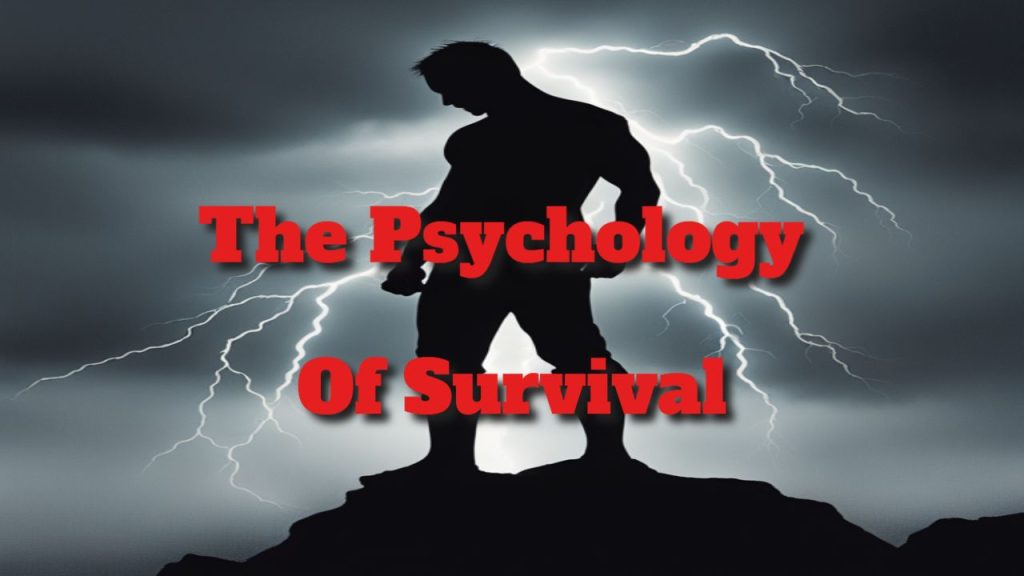Master Essential Strategies for Enhancing Your Survival Psychology in Extreme Situations
The saying, “desperate times call for desperate measures,” profoundly highlights the core principles of survival, particularly as we delve into the intricate aspects of survival psychology. When individuals confront life-threatening circumstances, the human psyche experiences a remarkable transformation, activating latent reserves of strength and resilience that typically lie dormant in our daily lives. This transformation is not merely an instinctive reaction; it signifies a holistic mobilization of both mental and emotional resources, revealing the extraordinary capabilities of our minds when faced with adversity. Grasping these psychological shifts is essential for anyone aiming to bolster their survival skills and develop greater mental toughness, making it a critical area of study for enthusiasts and professionals alike.
In the presence of life-threatening danger, a complex interplay of psychological mechanisms is set into motion. What truly happens in our minds when every second becomes critical? How do we navigate pivotal decision-making processes amidst overwhelming stress? Furthermore, how does our inherent psychological framework shape our ability to endure, adjust, and ultimately thrive in chaotic scenarios? These questions are central to understanding the intricacies of survival psychology, which we will explore in depth throughout this insightful article. By illuminating the foundational elements that empower us to withstand pressure, we can gain invaluable insights into our own intrinsic capacities and behavioral tendencies during crises, enhancing our preparedness for any challenges that may arise.
Join us on this enlightening journey into the fascinating realm of survival psychology, where we will dissect its nuances and reveal the key factors that influence our capacity to overcome obstacles and achieve success in life-threatening situations.
Understanding How Fear Shapes Our Survival Instincts and Responses
Fear is a fundamental component of our survival instincts, serving as a primal reaction that prepares our bodies to respond rapidly to potential dangers. This powerful emotion initiates a series of physiological changes aimed at increasing our chances of survival during perilous encounters. When fear grips us, significant physiological alterations occur: our heart rate accelerates, breathing becomes rapid, and muscles tense, creating a heightened state of alertness that primes us for immediate action. Comprehending this physiological aspect is crucial for anyone looking to refine their survival response, as it highlights the body's automatic systems designed to protect us in moments of crisis.
This amplified state of readiness not only sharpens our reflexes but also fosters quick decision-making, allowing us to tackle imminent threats effectively. Additionally, fear enhances our sensory awareness, enabling us to perceive our surroundings with greater acuity and identify potential risks that might otherwise go unnoticed. It compels us to focus intensely on our environment, increasing vigilance and helping us recognize crucial warning signs necessary for our survival. In the absence of fear, our ability to navigate hazardous situations could be severely compromised, underscoring its essential role in our survival arsenal. By understanding the intricate relationship between fear and survival mechanisms, we can deepen our appreciation for the complexities of human experience while equipping ourselves with practical knowledge that is applicable in real-world situations.
Building Resilience to Effectively Conquer Life’s Obstacles
When confronting fear in high-stakes situations, the ability to cultivate resilience becomes vital for sustaining the will to survive. Resilience can be defined as the capacity to recover from adversity, adapt to challenges, and bounce back from setbacks, even when faced with significant obstacles. This essential trait often distinguishes those who succumb to despair from those who muster the inner strength to persevere in their survival efforts. Actively cultivating resilience is a proactive measure that anyone can undertake to enhance their overall life experience, leading to better mental health and well-being.
It is crucial to understand that resilience does not imply the absence of fear or discomfort; rather, it embodies the steadfast determination to move forward despite emotional upheaval. This process involves fostering a positive outlook, establishing attainable goals, and skillfully utilizing available resources to navigate challenges. By developing resilience, individuals empower themselves to confront life’s hurdles with confidence, armed with the insights and strategies necessary to prevail. This transformative mindset not only proves beneficial in survival scenarios but also enriches one’s broader life experiences, instilling a sense of hope and enabling individuals to confront future challenges with renewed vigor and resolve.
Enhancing Decision-Making Skills Under Pressure for the Best Possible Outcomes
The ability to make sound decisions can be severely hindered in high-pressure environments. The acute pressure and urgency that characterize these critical moments can cloud our judgment, often leading to hasty or ill-considered choices. During periods of intense stress, the brain may enter a heightened state of arousal, triggering the fight-or-flight response, which can overwhelm rational thought processes and lead individuals to rely more on instinct rather than logical analysis. Recognizing these patterns is essential for formulating effective strategies to counteract the adverse effects of stress on decision-making.
This physiological response can significantly impair cognitive functioning, making it increasingly challenging to process information and weigh the pros and cons of various options. To mitigate these effects, it is vital to comprehend how stress influences decision-making and to actively employ techniques that reduce its impact. Strategies such as practicing deep breathing exercises, allowing for brief moments of contemplation, or seeking input from trusted advisors can greatly enhance one’s ability to make informed and effective decisions. By refining decision-making skills in high-pressure situations, individuals can markedly improve their chances of successfully navigating challenging and potentially life-threatening scenarios.
The Critical Importance of Social Support in Managing Crisis Situations
Recognizing the profound importance of social support is essential for effectively navigating stressful circumstances. A strong network of friends, family, and colleagues provides invaluable assistance and resources, enabling individuals to cope and thrive during challenging times. The emotional encouragement, practical help, and sense of belonging offered by social connections are vital for building resilience and enhancing overall well-being. During any crisis, the strength derived from social support can be a transformative factor, altering the trajectory of one’s experience.
Research consistently demonstrates that individuals who maintain robust social networks enjoy improved mental health outcomes and recover more swiftly from traumatic experiences. Furthermore, having a support system enhances problem-solving abilities, presents fresh perspectives, and provides essential motivation and encouragement. Recognizing the transformative impact of social networks during crises can significantly affect one’s experience, allowing individuals to draw strength and insights from others when needed most. Engaging with a supportive community not only aids in coping with immediate challenges but also contributes to long-term emotional resilience and recovery, reinforcing the belief that we are not alone in our struggles.
 Implementing Effective Coping Strategies for High-Stress Scenarios
Implementing Effective Coping Strategies for High-Stress Scenarios
What actionable strategies can be utilized to successfully navigate life-threatening situations? Here are several effective tips to consider:
– Maintain Calmness and Focus: Take a moment to breathe deeply and assess your surroundings before taking action. This approach can help clarify your thoughts and sharpen your focus.
Prioritize Safety: Safeguard yourself and others by seeking shelter or distancing from imminent threats whenever feasible. Your safety should always be the foremost priority.
– Stay Aware: Remain vigilant about your surroundings, paying close attention to potential dangers or changes in the environment that could affect your safety.
– Communicate Clearly: If necessary, signal for assistance or inform others of the danger you are encountering. Effective communication can be crucial in survival scenarios.
– Trust Your Instincts: Rely on your gut feelings and make prompt decisions based on the information accessible to you. Your instincts can provide invaluable guidance.
– Utilize Available Resources: Maximize the use of all available tools and resources to enhance your chances of survival, whether they are physical tools or social support.
– Maintain an Optimistic Mindset: Cultivate a belief in your ability to overcome the situation. A positive outlook can significantly impact your resilience and reactions.
Effective Coping Strategies for Trauma Survivors and Individuals with PTSD
For individuals with a history of trauma or PTSD, implementing effective coping strategies during life-threatening situations is vital for managing anxiety and fostering resilience. Tailoring these strategies can empower individuals to regain control over their responses and enhance their coping capacity.
– Practice Deep Breathing Techniques: Utilize grounding strategies to stabilize anxiety levels and foster a sense of calm. Deep breathing can help center your thoughts and alleviate panic.
– Seek Social Support: Don’t hesitate to reach out to friends, family, or mental health professionals for assistance. Connecting with others can provide critical support during challenging times.
– Engage in Self-Care Practices: Prioritize activities that promote mental and physical well-being, aiding in recovery and resilience building over time.
These coping mechanisms are crucial for managing anxiety and cultivating resilience in difficult situations. It is essential to understand that resilience is not merely an inherent trait; it can be actively nurtured through consistent practice and support. With the appropriate strategies in place, anyone—regardless of their background—can enhance their capacity to rebound from adverse situations.
Additionally, understanding how decision-making under stress impacts long-term mental health and recovery from traumatic events is paramount. The manner in which decisions are made during high-pressure situations can significantly affect recovery trajectories and overall mental health in the aftermath of life-threatening experiences.
Identifying the psychological barriers individuals encounter when seeking social support during crises is equally crucial. Common challenges during these pivotal moments may include feelings of vulnerability, anxiety about judgment, trust issues, and difficulties in articulating one’s needs. Acknowledging these obstacles is vital, as they can impede the process of seeking help and exacerbate stress and anxiety.
To effectively navigate these hurdles and access the necessary support, consider taking manageable steps such as confiding in a trusted friend, consulting a mental health professional, or joining a support group. Remember that reaching out for help is a courageous step, and there are individuals ready and willing to assist you when you need it most.
Exploring the Intriguing Field of Survival Psychology
The psychology of survival represents a rich and multifaceted area of exploration that provides profound insights into human behavior. While anxiety is a natural response to life-threatening events, resilience is what empowers us to recover from adversity and continue pursuing our goals. By understanding how stress affects decision-making, we can significantly increase our odds of survival. Moreover, recognizing the essential role of social support offers the necessary strength and comfort needed during challenging times.
Employing effective coping strategies enables us to navigate complex and life-threatening situations with greater skill, ultimately leading to enhanced resilience and improved mental health outcomes. This examination of survival psychology not only deepens our understanding of our own capabilities but also equips us with the practical tools essential for confronting unforeseen challenges with confidence and determination.
Frequently Asked Questions About Survival Psychology
How do anxiety disorders impact survival psychology?
What psychological differences exist in survival responses between individuals with anxiety disorders and those without?
Individuals with anxiety disorders may exhibit heightened responses to fear and stress, while those without may engage in more adaptive coping strategies, leading to differing survival outcomes.
What are the most effective coping mechanisms for trauma survivors or individuals with PTSD during survival scenarios?
The Article Survival Psychology: Understanding the Mindset Appeared First On Survival Avenue.
The post Survival Psychology: Mastering the Mindset appeared first on Survival Bite.
The Article Survival Psychology: Unlocking Your Mental Resilience Was Found On https://limitsofstrategy.com


This exploration of survival psychology resonates deeply with me, particularly the idea that our hidden strengths can emerge in the face of adversity. I’ve often found that moments of crisis can catalyze profound personal growth, propelling us to develop traits like resilience and adaptability that we may not have realized we possessed.
You’ve hit the nail on the head with that. It’s funny how a little chaos can bring out the superhero in us, right? I mean, when life throws a pie in your face, you suddenly discover you’ve got an impressive knack for dodging desserts and finding the nearest napkin. Crisis moments can act like a pressure cooker for personal growth—who knew we had all these hidden skills simmering away?
“Click here for a giggle-worthy surprise—your future self will thank you!”
https://mannland5.com/quillbot
I completely relate to what you’re saying about survival psychology and how those hidden strengths can surface during tough times. It’s interesting how adversity can function almost like a mirror, revealing qualities we didn’t know we had.
This is fascinating! It’s incredible to think about how our brains can shift into high gear during extreme situations. I often joke that my survival instinct kicks in when I’m out of snacks during a movie marathon—trust me, that’s classic fight or flight right there!
It’s interesting how our brains can react so strongly even in everyday situations, like the snack panic during a movie marathon. It makes me think about how the concept of fight or flight is sometimes more about the little daily stresses rather than life-or-death scenarios. I guess it’s our brain’s way of keeping us alert and engaged, even if the stakes are a bit lower.
You bring up such an interesting point about the brain’s response to everyday scenarios like that snack panic. It’s fascinating how our instincts can kick in even when we’re not technically in danger. It really highlights how our bodies are wired to respond to stress or urgency, no matter the scale of it. I often feel that same rush when I’m in the middle of a binge-watch session, and I’m suddenly hit with a deep sense of urgency about snacks or drinks. It’s like my brain is saying, “This is important!”
You touched on a fascinating point about our brains and those little moments of panic. It’s true that the fight or flight response often kicks in during seemingly mundane situations. The snack panic during a movie marathon is a perfect example—who hasn’t felt that rush when you realize you’re running low on popcorn?
“Absolutely! It’s fascinating how our brains shape our reactions, even in the simplest moments. If you’re curious to dive deeper into the science of stress and everyday triggers, check out this insightful resource!”
https://mannland5.com/quillbot
You’ve hit on something really significant about our brains and daily life. It’s fascinating to consider how those little moments—like the snack panic during a movie marathon—can trigger such strong responses. They remind us that our brains are wired to keep us on our toes, even when the situation is as simple as deciding what to munch on while binge-watching.
You raise a fascinating point about the everyday triggers for our brains. The snack panic during a movie marathon perfectly illustrates how those smaller moments can activate our stress responses. It’s interesting to consider how our evolutionary instincts have adapted to modern life. Rather than facing actual threats, our brains are wired to react to situations like missing a snack, which can heighten our sense of urgency.
It’s fascinating how you dive into the psychology of survival, especially the transformation of the self in extreme situations. I often think about how our everyday stressors pale in comparison to life-threatening emergencies, yet the mental resilience we develop in mundane challenges could very well be our training ground for more severe trials.
Your exploration of survival psychology resonates deeply, especially in today’s fast-paced world where many of us face our own ‘extreme situations’—albeit not always life-threatening in the traditional sense. I’ve found that the principles you outlined can also be applied to everyday challenges, such as navigating personal crises or significant life transitions.
Your insights into survival psychology truly resonate with me, especially the idea that our latent strengths can surface in extreme situations. It’s fascinating to consider how our mindset can shift dramatically when faced with danger, revealing capabilities we often overlook in our everyday lives. I’ve found that situations requiring intense focus, such as navigating a difficult hiking trail or handling a sudden emergency, often push us beyond our perceived limits.